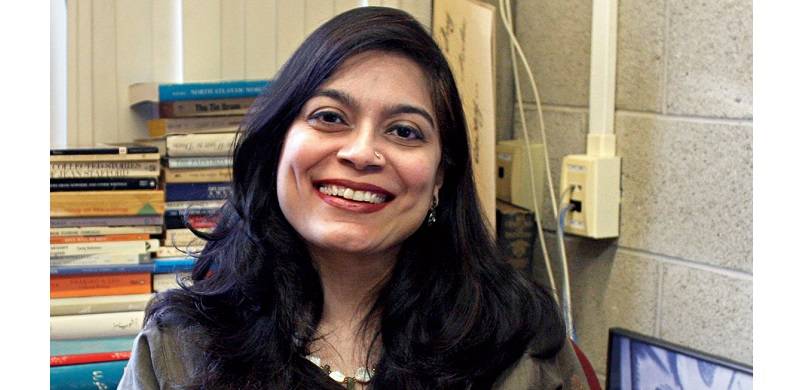
Letter_Rutgers
Academics from a wide variety of backgrounds, in a letter addressed to the Chancellor at Rutgers University (Newark, NJ) in the United States have highlighted the discrimination faced by Pakistani-American Professor Sadia Abbas. The letter states that the signatories are “astonished” by the university administration’s communication to her that “she might be better off elsewhere.” The signatories to the letter have highlighted their dismay that the university administration has, in their view, failed to support her and instead written to her what amounts to “a declaration of discouragement and even a desire for termination.”
The list of signatories to the letter consist of prominent voices in the academy from South Asian and Muslim backgrounds amongst others. They include figures such as Gilbert Achar, Faisal Devji, Khaled Mattawa, writer Sophia Naz and artist Shahzia Sikander. They have highlighted the contributions of Dr Abbas to scholarship in literary and cultural studies.
Commenting on the difficult intellectual environment in which such scholars operate, they note:
“In a polarized American society, where opposing sides are far too clearly defined and unable to communicate with each other apart from through a set of stereotypes, Dr Abbas is able to approach them both in sophisticated and critical ways, if only in order to breach their boundaries. While quite firm in her own political convictions, which are unashamedly on the left, she is deeply concerned by the lack of self-questioning within the new academic orthodoxies that emerged in the 1990s to dominate entire fields in the post-9/11 period. These include the critique of secularism and orientalism.”
Highlighting the role of Dr. Abbas in promoting diversity in critical voices within the academy and beyond, they note:
“Dr Abbas’s work on secularism, as well as orientalism and racism, is not confined to her research but manifested in her teaching and promotion of minority students in particular. Many of us have had the opportunity to speak at Rutgers, Newark, at Dr Abbas’s invitation, and have seen up close the careful and time-consuming way in which she educates and promotes all students with a remarkable capacity to reach those from disadvantaged circumstances stemming from broad societal discrimination, but also including students of immigrant backgrounds, especially young Muslim women who take her as a model. She has contributed considerably the development of Islamic studies at Newark, initiating an Islamophobia speaker series, chairing the Islamic cluster hire—which yielded three new faculty in the departments of Africana, Art History, and English.”
In light of the “crucial importance of her work in literary studies on Islam in colonial and contemporary times,” these scholars believe that Dr. Abbas is “one of the premier Muslim and Pakistan women faculty on your campus, which serves a large South Asian and Muslim population.”
According to the signatories to this letter, the university administration ought to be extending her its full support and encouragement, instead of an attempt to “discourage, deny, and drive her out.”
Academics from a wide variety of backgrounds, in a letter addressed to the Chancellor at Rutgers University (Newark, NJ) in the United States have highlighted the discrimination faced by Pakistani-American Professor Sadia Abbas. The letter states that the signatories are “astonished” by the university administration’s communication to her that “she might be better off elsewhere.” The signatories to the letter have highlighted their dismay that the university administration has, in their view, failed to support her and instead written to her what amounts to “a declaration of discouragement and even a desire for termination.”
The list of signatories to the letter consist of prominent voices in the academy from South Asian and Muslim backgrounds amongst others. They include figures such as Gilbert Achar, Faisal Devji, Khaled Mattawa, writer Sophia Naz and artist Shahzia Sikander. They have highlighted the contributions of Dr Abbas to scholarship in literary and cultural studies.
Commenting on the difficult intellectual environment in which such scholars operate, they note:
“In a polarized American society, where opposing sides are far too clearly defined and unable to communicate with each other apart from through a set of stereotypes, Dr Abbas is able to approach them both in sophisticated and critical ways, if only in order to breach their boundaries. While quite firm in her own political convictions, which are unashamedly on the left, she is deeply concerned by the lack of self-questioning within the new academic orthodoxies that emerged in the 1990s to dominate entire fields in the post-9/11 period. These include the critique of secularism and orientalism.”
Highlighting the role of Dr. Abbas in promoting diversity in critical voices within the academy and beyond, they note:
“Dr Abbas’s work on secularism, as well as orientalism and racism, is not confined to her research but manifested in her teaching and promotion of minority students in particular. Many of us have had the opportunity to speak at Rutgers, Newark, at Dr Abbas’s invitation, and have seen up close the careful and time-consuming way in which she educates and promotes all students with a remarkable capacity to reach those from disadvantaged circumstances stemming from broad societal discrimination, but also including students of immigrant backgrounds, especially young Muslim women who take her as a model. She has contributed considerably the development of Islamic studies at Newark, initiating an Islamophobia speaker series, chairing the Islamic cluster hire—which yielded three new faculty in the departments of Africana, Art History, and English.”
In light of the “crucial importance of her work in literary studies on Islam in colonial and contemporary times,” these scholars believe that Dr. Abbas is “one of the premier Muslim and Pakistan women faculty on your campus, which serves a large South Asian and Muslim population.”
According to the signatories to this letter, the university administration ought to be extending her its full support and encouragement, instead of an attempt to “discourage, deny, and drive her out.”

